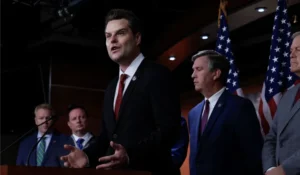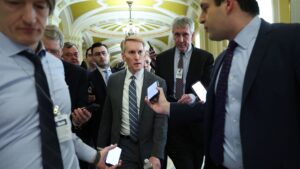Vice Presidential Debate
Following an unconventional first Presidential debate, Vice President candidates Tim Kaine and Mike Pence squared off Tuesday night, both representing their respective candidate’s ticket as well as their own opinions.
Elaine Quijano, acting as mediator, started off the debate by asking the candidates what temperament, skills or attributes qualified them to be President should something happen to their running mates. Tim Kaine responded by citing the historical impact women have had on history in instances such as the Brown v. Board of Education, saying that he was proud to be working behind Hillary Clinton, another great woman sure to make history. Similarly, Mike Pence commended Trump for his bold and then referred to his “lifetime of experience” in Congress as hopefully enough.
Then, on the second question in, Kaine revealed that he would waste no time, accusing Trump of having “started a speech in his campaign where he started off by calling Mexicans criminals and rapists.” At that point, the mood of the debate shifted starkly, adapting a tone more similar to the Presidential debate. Pence proved he meant business when he responded by calling Clinton’s campaign an “avalanche of insults.” Tim Kaine then interrupted Mike Pence, and would not cease, even when the mediator politely asked him to respect the governor since he already had speaking time.
As they moved onto the economy, Mike Pence explained that “lowering taxes across the board…ending the war on coal…repealing Obama care…[and] repealing all of the executive orders that Obama has signed that are stifling” businesses would greatly improve the economy. He accused Clinton’s plan of taxing too heavily. However, Kaine responded back by passionately labeling Trump’s plan as a “You’re Fired Plan.” He then went on to boast that Clinton’s tax plan would be economically beneficial to the middle and lower classes, and it would help small businesses.
Most interestingly, the ultra conservative Mike Pence attempted to lessen the blow of Trump’s lack of paying federal income tax over the past few years. He walked the fine line between commending Trump for his actions and simply explaining why his actions were not technically illegal relatively well for the compromising position he was put in, asking Kaine if he took advantage of his deductibles, putting a much softer tone on the whole situation.
When asked about police violence, Kaine promoted the “fight against gun violence in the United States” as well as “closing the gap” between the police force and their communities as to make both parties more comfortable. Surprisingly, Pence responded similarly, humorously saying “at the risk of agreeing with you, community policing is a great idea.” However, he drew the line at that, using Clinton’s accusation of “implicit bias,” usually angled towards the police department, towards the way the public reacts in every police shooting. In other words, he implied that not every shooting requires a riot— it depends on whether it was unjust, but in order to distinguish between what is corrupt and what is not Americans must study the facts before they act. He proposes that America “assert a stronger federal officer” in order to give the police force support.
With regards to immigration, Pence showed strong support for his candidate, proud to finally have a plan after “twenty years” of simply deliberating, but taking no action. Kaine attacked Pence, saying that he “could not believe” that Pence would support the “deportation force” that Trump originally included in his plan. However, Pence responded by arguing that “we already have a deportation force,” referring to Immigration and Customs Enforcement. Kaine shot back by saying that Pence is “fuzzing up” what Trump plans to do.
In regards to the military, Kaine started off comedically by saying “Donald Trump can’t start a twitter war with Miss Universe without shooting himself in the foot.” Then, he went on to cite Trump’s desire to grant many countries nuclear weapons. Pence responded by commending Obama for getting rid of Bin Laden, but then reluctantly acknowledged that ISIS, not Al Qaeda, is a much greater threat at this time, partly due to Clinton’s failure. He also accused that Obama, similar in ideology to Clinton, has “somewhat guaranteed that Iran will become a nuclear power,” increasing instability in the Middle East and eventually the world.
Matters got most heated when the topic freelanced to the credibility of profiling in the war against terror. Trump and Clinton have starkly contrasting opinions on how to monitor incoming immigrants from the Middle East, with Trump promoting closing the gates to all Muslims and Clinton supporting accepting them into the country but administering a background check. Kaine accused Trump and Kaine of being “completely unempathetic” to thousands of Muslims and Syrian refugees. However, Pence passionately argued that they would put the safety of the American people first. Also, instead of accepting refugees due to the Russian attacks on the Syrian refugee city of Aleppo, Pence proposed the establishment of a safety zone in northern Syria for these refugees and simultaneous military action against Assad if the attacks continue. Kaine agreed with the safe zone, but accused Trump of not truly supporting the military since he didn’t pay taxes. He did not comment on whether Clinton would use military force against Assad, but jumped on the opportunity to disprove the misconception that Trump would be good for the military.
In a closing statement, the mediator next asked each candidate how to best unite the American people, Kaine spun it into talking about the controversy around Planned Parenthood, which stems mostly from its performance of abortions, both candidates softened their tones, recognizing it as the sensitive issue it is. Pence asserted that it was a matter that went against many taxpayer’s faiths, and it was unfair that they had to pay contributions to Planned Parenthood, which pays for something that they believe is a sin. Kaine claimed it was a “fundamental question,” but he feels that “it is not the role of the public servant to mandate that for everyone else.” He said that he doesn’t think that “women should be punished” for deciding to have abortions and that the government should “trust women” to do what’s right for themselves.
Lastly, Pence gave his own answer to what will bring the United States unity, promoting change in how Washington is run. He explained how, by doing that, Americans will be able to “stand tall, [and] stand together,” slyly invoking Clinton’s slogan in the last words of the night.
Overall, it is clear that Kaine was the more aggressive of the two candidates throughout the debate. Ironically, unlike his running mate, Pence remained refined and mostly policy focused throughout the night. From the second question, it was clear that Kaine would be playing the role of the asserter and attacker on the candidates’ personal character traits rather than their policies. Also, on multiple occasions, he continued to speak over the mediator, who was the first American Asian mediator of a Vice Presidential debate. It wouldn’t be surprising if his at times brash disregard for the mediator brought him some heat from the media in the following days. Yet, according to NBC news, it is unlikely that either candidate’s performance was strong enough to substantially change the minds of voters. However, only the polls will tell.








